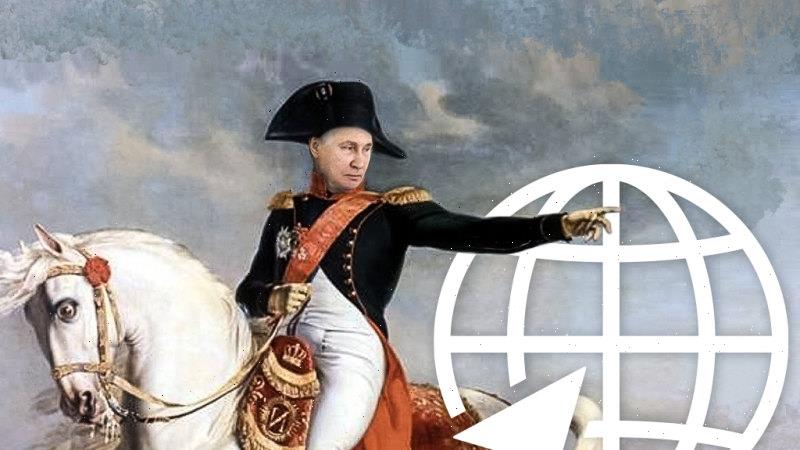On Vladimir Putin’s watch, Russia has grown into a cyber and trolling superpower.
Whatever Russia’s real-world challenges, on the internet, Russians in service of the Kremlin have moved from strength to strength over the past decade in surprising and effective ways.
Like France’s military emperor Napoleon conquering Europe, Russia on Putin’s watch has waged a series of skilful campaigns expanding its reach across the internet and social media, scoring rapid victories where his hapless adversaries didn’t realise there was a battlefield.
Vladimir Putin, as the Napoleon of the internet.Credit:The Age
The modus operandi of Russia has been to use anonymous or proxy voices to sow doubt: about elections, about politicians, about climate science, and about reality itself.
Putin (or his advisers) understood how to read and seize the global moment – politically, socially, technologically – far better than his democratic rivals.
But if Russia has been much quicker to exploit the political potential of hacking and trolling, Western democracies have finally recognised that information is everything in the 21st century.
A vast community of anti-disinformation companies and organisations have emerged in recent years, providing an early warning system for disinformation that didn’t exist when the Kremlin intervened in the US election of 2016.
More recently, even before Russia attacked Ukraine, the US and UK governments took new steps to challenge Putin in the domain of information.
In the months before the invasion, the US declassified and shared information warning of Russia’s plans, to initial disbelief. The US and the UK revealed that Russia had already positioned operatives to stage a fake attack and to install a pro-Russian leadership in Kyiv. The US also repeatedly warned of “false-flag” operations to be staged by Russia as a pretext for invasion.
They have issued numerous statements forewarning of the specific lies being pushed by the Kremlin.
This unprecedented transparency has enabled the democratic world to dispel disinformation before it gets traction. It has kept Putin on the back foot and allowed space for Ukraine to advance its narrative.
Back in 2014, the Kremlin was good at convincing the global public that any talk of Ukrainian independence was destabilising, or a form of Nazism, or a proxy war waged from the West.
Eight years later, Ukraine has been able to get the message out to the democratic world about their legitimate desire for self-determination. Onlookers in the West who might have believed Ukraine was a quasi-Nazi state are now instead seeing the will of ordinary Ukrainians not to be coerced.
In President Volodymyr Zelensky, the democratic world sees a charismatic leader who, at great personal risk, continues to lead and rally his nation under attack.
The global public is learning about Ukrainian identity, history, and culture – a nightmare scenario for Putin.
Ukranian President Volodymyr Zelensky, receiving a standing ovation at the US Congress earlier this month, has been able to get his message to the world.Credit:The New York Times via AP
Meanwhile, Russia’s notorious information warriors have struggled to sell the invasion to the democratic world. They’re presenting “Ukrainians and Russians” as victims, hitting familiar themes about NATO, and suggesting Russia had no choice.
But against the visual proof of Russia’s targeting of civilians, the renderings fail to win many believers. Even the Kremlin’s long-time supporters have been stunned by Putin’s decision to invade.
After all, siding with the Kremlin’s criticism of Western hypocrisy after the global financial crisis, or US invasion of Iraq is one thing: siding with the Kremlin’s view after Russia’s army bombs a theatre sheltering women and children is quite different.
Napoleon, in his era, was a force of political modernisation, and Putin has helped modernise the Western world through his use of cyberattacks and internet influence campaigns, testing the strength of democracy as a system to its core.
He thrived when he could hide how hostile he was to everything that free societies hold dear, but his decision to invade Ukraine has ripped off his mask.
Now that the fighting is out in the open: we wait to see if the Napoleon of the internet has arrived at his Waterloo.
Most Viewed in World
From our partners
Source: Read Full Article


